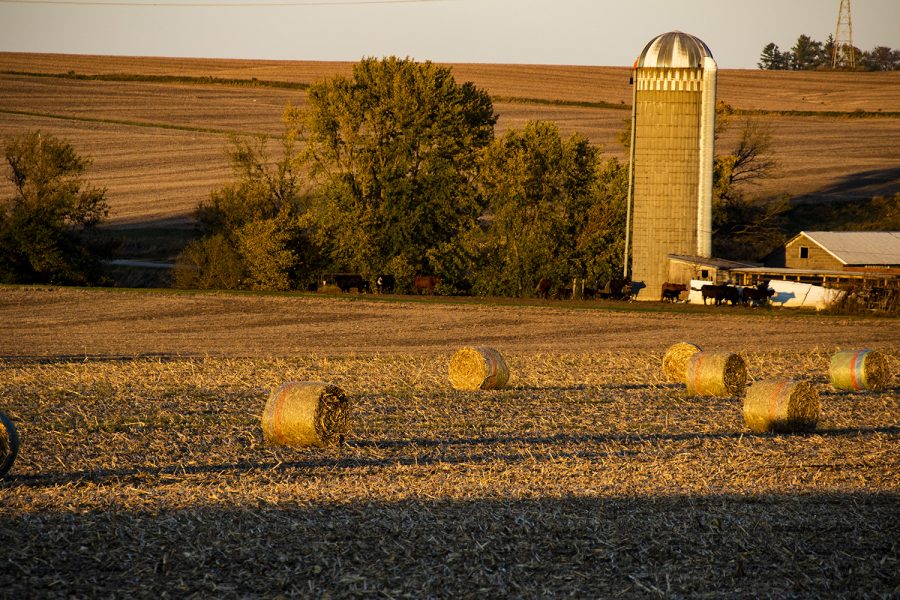College of Public Health examines mental health challenges for farmers
Two new studies from the University of Iowa’s College of Public Health highlight the challenges of farming communities, including rates of dementia and the effects of COVID-19.
Bails that were made from the after product of the corn harvest wait in a field for pickup on Oct. 12, 2020. (Jeff Sigmund/Daily Iowan)
February 10, 2021
University of Iowa College of Public Health professors studying farmers’ mental health are finding that the effects of COVID-19 on Iowa farmers are one segment of a combination of forces that impact the mental and physical health of farmers.
The college is currently working on a variety of studies about farmers. A soon-to-be-published article from the UI Department of Health Management and Policy covers how the prevalence of dementia in agricultural workers and the ongoing survey of the effects of COVID-19 on farmers both highlight the compacting stressors on the farming community.
UI Clinical Associate Professor in the Department of Occupational and Environmental Health Brandi Janssen said farmers have a high fatality and injury rate and lack a typical retirement age, but occupational stress is typically linked with uncontrollable elements.
“Farmers tend to report that those off-farm factors are much more stressful than the daily activities, even though those daily tasks can put them at physical risk,” Janssen wrote in an email to The Daily Iowan.
Related: Iowa farmers struggle as COVID-19 impacts ripple through food supply
UI Assistant Professor in the Department of Health Management Kanika Arora, an author on the study, titled “Dementia and Cognitive Decline in Older Adulthood: Are Agricultural Workers at Greater Risk?” said the upcoming publication looks at older adults whose longest job was in the agricultural sector and the prevalence of dementia in them versus non-agricultural workers.
Arora said the research examined data points of around 15,000 people from 1998 to 2014, collected from the Health and Retirement Study, an ongoing study cataloging the cognitive health of aging Americans.
“The reason why I became interested in this topic was because there are actually a lot of factors that are salient to agriculture, like hearing impairment, depression, [and] pesticide exposure,” Arora said. “There have also been independently shown to increase dementia risk.”
Despite these connections to risk of dementia, Arora said no one looked into whether farmers who are more consistently exposed to these factors were truly at higher risk — which turned out to be true, as 46 percent of farmers are at greater risk for getting dementia.
Arora said dementia in farmers is often missed and the danger of the job with the disease tends to compound. For example, she said wandering is a common manifestation in Alzheimer’s disease, and wandering on a farm comes with more risks, such as heavy machinery and dangerous chemicals.
“Early detection and early adaptation to this disease are critical,” Arora said. “I think it’s important to be guided to be honest about being diagnosed with Alzheimer’s disease.”
UI Professor of Community and Behavioral Health Rima Afifi currently oversees a survey about the impact of COVID-19 on farmers.
The study is divided into categories or “buckets,” Afifi said, with one involving various mechanisms for coping and social support. Mental health is a big focus of the study, but she said that mental health refers to a state of positive well-being in this case.
Afifi said the challenges that farmers face is a sort of storm that COVID-19 is only one part of. While the survey is still in its early stages, she said it’s important to focus not necessarily on fixing these issues for the farmers but coming up with interventions tailored to the needs of individuals and farming communities.
“There’s a lot of positive protective factors within farming communities,” Afifi said. “They’re close knit. They have values of working alongside each other and helping each other out. I think all of those things are really important in thinking through interventions.”






